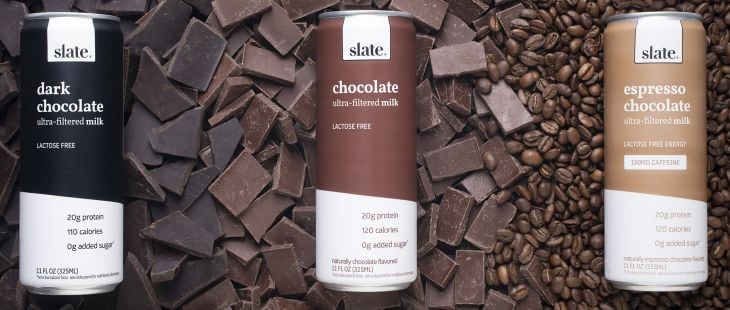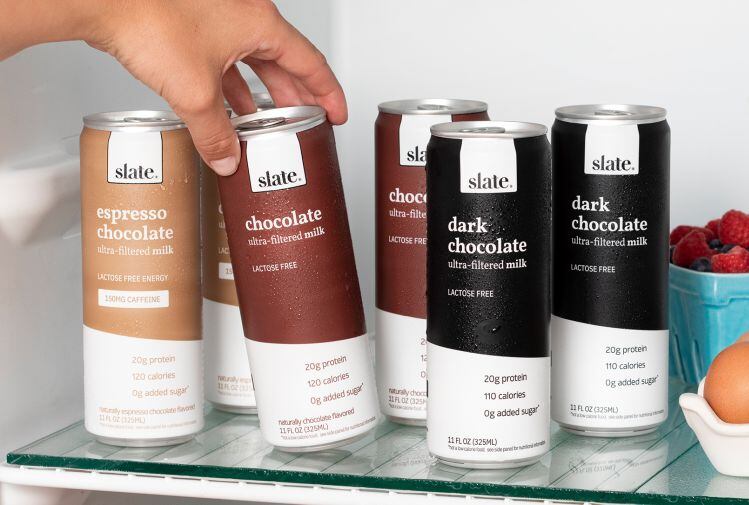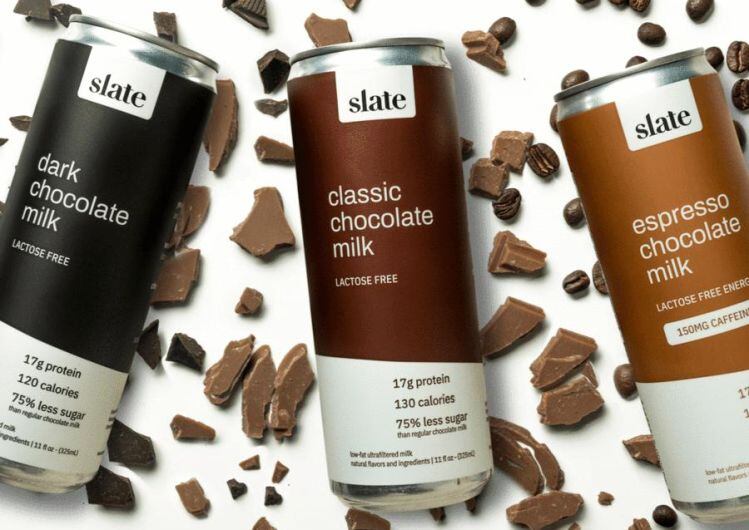Slate Milk has grown 300% in the past year and increased its head count from three to 30 employees, said co-founder Manny Lubin, who claims millennials love chocolate milk, but want something with more protein and less sugar in a format that’s “a bit more hip than that bottle of YooHoo.”
The Slate brand is still learning what is resonating with shoppers, but key usage occasions include breakfast, the 3pm pick-me-up, post workout and late night treat, said Lubin, who founded the company with college friend Josh Belinsky in 2018.
The heaviest users are “active millennials and healthy-minded parents, typically aged 20-44, that are exercising weekly, trying to increase protein and decrease sugar in their or their children's diet,” Lubin told FoodNavigator-USA.
“Our repeat purchase rate online in the past 30 days is double what it was all of 2020, and we believe it's due to not only the taste improvement [the brand recently went from 17g protein and 9g added sugar to 20g protein and 0g added sugar], but also the nutritional makeup of the products.”
'The product has been very well received by the fitness and sports communities'
Retail partners include Harris Teeter, Giant Food, Giant Martin's, Wakefern, Hannaford, Bristol Farms, Central Market, Whole Foods, Wegmans, and Publix, said Lubin, who says the brand is now sold in around 4,000 stores as well as online at slatemilk.com and Amazon.
“We are now sold in dozens of gyms and fitness centers across the country, and also now sell to a handful of professional sports teams. This is a channel we are starting to put more of a focus on as the product has been very well received by the fitness and sports communities due to its high protein and low sugar content.”
As for placement in store, he said, “Our consumer shops for other single serve beverages. While we have success in dairy coolers, we have found that being merchandised alongside other single serve coffees and functional beverages has allowed us to build our brand in grocery stores the quickest. While our products are chocolate milk, we are really selling indulgent strength and energy - and offer both caffeinated and non-caffeinated options.”

There are three flavors of Slate: Dark Chocolate, Chocolate, and Espresso Chocolate (the latter has 150mg caffeine)
Ingredients (Chocolate Milk): Ultrafiltered skim milk blend (ultrafiltered skim milk, water), allulose, natural flavors, chicory root fiber, cocoa (processed with alkali), salt, pectin, tripotassium citrate, monk fruit, cellulose gel, cellulose gum, lactase enzyme, vitamin A palmitate, vitamin D3
The process: Slate Milk uses ultrafiltration on its milk to concentrate the protein, eliminate the lactose/milk sugar (it also adds the lactase enzyme that breaks down any residual lactose) and remove some water. It then adds allulose and monk fruit for sweetness and vitamins A and D, said Lubin.
"We really believe allulose is the future of sweet foods and drinks. We've experimented with many options, and allulose - on taste, texture, and nutrition - we think is the best option, especially when combined with monk fruit. The crystalline market is tight right now, but we're fortunate to have a great relationship with our supplier. It doesn't leave an aftertaste, has 1/10th the calories of sugar, and it tastes just like sugar."
In order to create a shelf-stable product, the cans go through the retort process (think a large pressure cooker).
Nutritionals: Each 11oz can has 20g protein, 0g added sugar (1g total sugar), 3-5g fiber from chicory root, and 110-120 calories. As a point of comparison, 11oz of TruMoo chocolate whole milk has 11g protein, 32g sugar and 275 calories.
We rely heavily on social media to build our brand online
The e-commerce side of the business, meanwhile, has been growing rapidly since the new higher protein, zero sugar version launched in the spring, he said.
“We rely heavily on social media to build our brand online - as we've tried a plethora of different strategies but it always proves to be the most effective for Slate. Our team is in Facebook's Ad Manager daily, and we also have a team that works with hundreds of influencers who love our products to help get the word out about Slate.”
"Our influencer strategy is really to try to find people who love Slate products and convert them into fans and advocates for the brand."
Shark Tank (spoiler alert: Mark Cuban was not a fan of the early prototype)
While many investors interested in early-stage CPG brands are heavily focused on plant-based products, they also recognize the growth in lactose-free and ultra-filtered, higher protein milks such as fairlife, and the growth in beverages such as cold brew combined with dairy milk, he said.
But it hasn’t all been plain-sailing, added Lubin, who observes that the brand’s appearance on Shark Tank last year did not go entirely as planned (spoiler alert: Mark Cuban was not a fan). That said, the Sharks’ feedback during the episode – which aired almost a year after it was filmed, by which time the formulation had changed considerably – drove Lubin and Belinsky to work even harder to get the sweetening and flavoring system right.
“When we filmed we were pre-launch and the version the Sharks tasted was not the version on shelf today, but we appreciate all feedback,” said Lubin.
“We’re pretty encouraged by the kind of feedback we’re getting online and the velocities we’re seeing in stores now, but we’re always listening to consumer feedback and trying to improve. The key was getting something that delivered the sweetness and indulgent flavor profile without a monk fruit aftertaste.”


